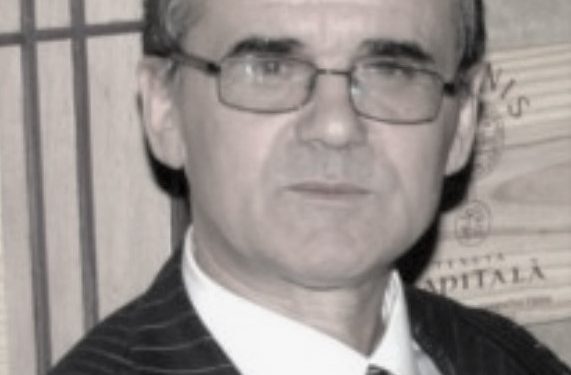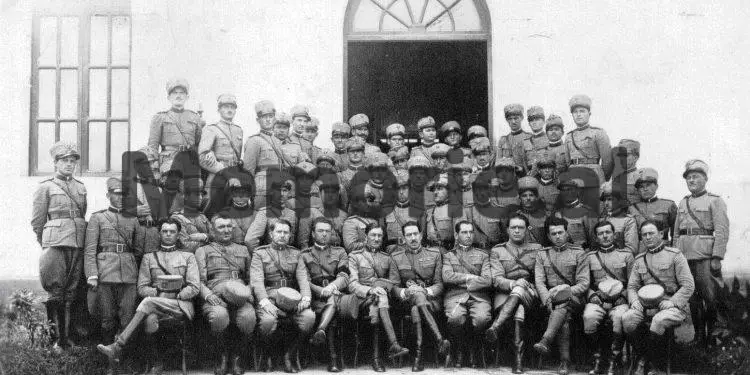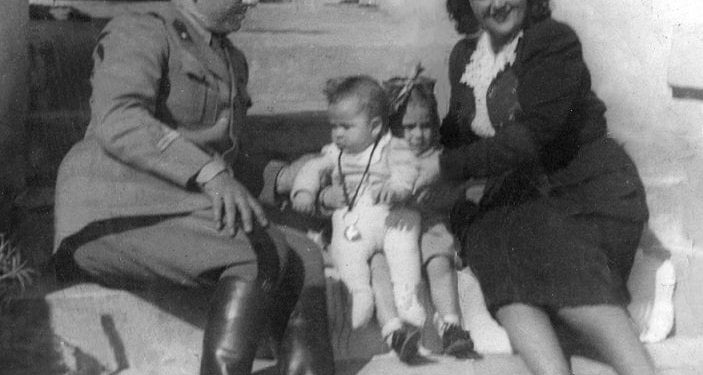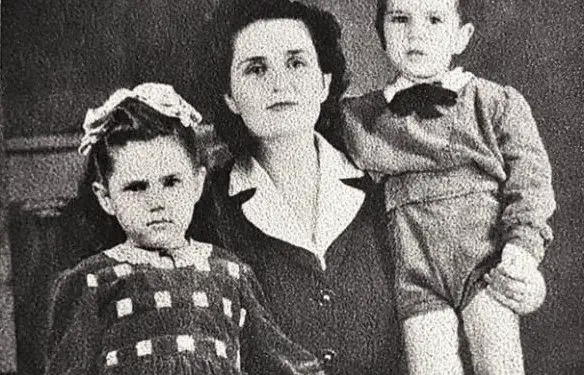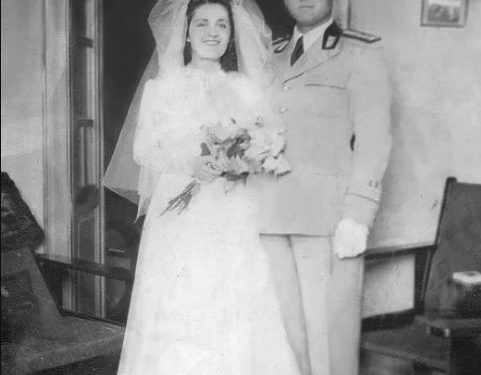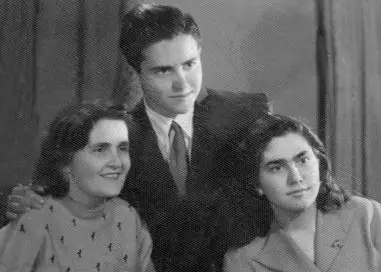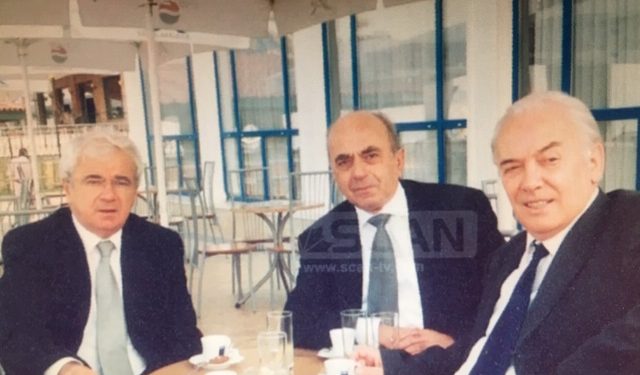By Dalip Greca
Memorie.al/ Fratari, that rugged place in the corner of wild Mallakastra, has made a name for itself not only in the south, but in all parts of the motherland. The men of that country were the first support of Rrapo Heklai, who, because he bravely opposed the High Gate, in the middle of the 19th century, was sentenced to death. From Fratari, there are dozens of men who bravely stood the storms of time. And among these men, there is the outstanding nationalist, the one who loved the homeland and the Monarchy, just like his home, Rauf Fratari. He was born in Fratar, in 1908, in Mallakastër where the winds of Albanian autonomy had begun to blow. Mother Sabire, that brave woman from the famous door of Frashërllinje in Përmet, was full of friends and well-wishers to congratulate her. She only missed her husband, Hajredini. But who was Hajredin Fratari?
Graduated from Hylqies University in Istanbul, Hajredini, still 24 years old, was sent to Ioannina. There he learned practical administration and after some other exams in Istanbul, in 1906, he was sent by the High Gate, with the duty of sub-prefect, to one of the sub-prefectures of Mamisi, Izmir Province in Turkey. Although he worked there until 1910, he was closely connected with the main leaders of the Albanian autonomist movement. He is among the initiators of the Berat Albanian Committee, who strongly supported Ismail Qemali, Shah Kolonje and Hasan Prishtina, to raise their voice in the Turkish parliament, regarding the Albanian alphabet and language.
At the beginning of 1912, Hajredin Fratari, finally abandons his high career in the Turkish administration and goes to Mallakastër and Berat, sparing neither his mental strength nor his wealth, and puts himself at the forefront of the movement for the independence of the Albanian lands. Of course, a personality like Hajredin Fratari was clear that Albania’s independence could only be achieved thanks to the unification of the ideas and forces of all Albanians towards a common goal. For this purpose, he participates in the Assembly of Junik, on May 25, 1912, as a representative of the people of Mallakastra and Berat. His speech would be listened to with respect, among the 250 men gathered in Junik, who represented all the Albanian vilayets. Based on his great patriotic activity, his wisdom and courage, the people of Mallakastra elected Hajred Fratari as their delegate in the historic Assembly of Vlora in November 1912. In this way, the man of Mallakastra was ranked among 33 the signatories who announced with their act, the independence of the native lands.
In the years 1912-1914, Hajredin Fratari, would serve with great zeal and passion, as sub-prefect of Skrapar, putting his knowledge to life, to bring the ideas and great work of the first Albanian government out of Assembly of Vlora. After the thousands of problems faced by the Albanians of that time, Hajredin Fratari had to face Anatolian elements who still hoped that the future of Albania was in Istanbul. Even when Prince Vidi came to Albania, although there were many threats, Hajredini did not leave his post. But with his departure, when Central and Southern Albania were falling into the hands of Esat Pasha Toptan and Haxhi Qamili, then the man of Mallakastra went to his home, in Fratar, and for three or four months, dealt with building the first Albanian school in that village.
But the attitude of Hajredini could not be forgotten by the Malkastrians rebels, who blindly followed Haxhi Qamili, this hateful figure of the Albanians, in those places. In the first days of April 1915, they go to Fratar and arrest Hajredin, at his house. Four days later, while he tried to escape from the guards, he was shot and killed behind the arms. Anyway, in the telegram about this murder, it was said: “Berat April 15, 8 o’clock in the day. Addressed to the chairmanship of the Elbasan Committee, Tirana, Krujë. Mr. Hajredin Fratari, one of the sub-prefects of the Turkish administration, is a supporter of the person of Ismail Qemali and became the sub-prefect of Skrapar. After the recent events, he was imprisoned in the prison of Berat, and since it was not considered acceptable to keep him in prison, we decided to transfer him to the prison of Kavaja. For your information, you are informed that today, where you are being escorted to Kavajë, under the notice of a detachment… I found out that on the way, you tried to escape and after you did not obey the “stop” order, given to you two or three times by the detachment, we killed you from rifle shots, we killed you from the side of the detachment”. (Central Archive of the State-Tirana. Fund 245, folder 26, page 118).
Rauf, 7 years old, was going to start learning at Fratari’s school, which he had built from the ground up, his father, Hajredini, and even the first teachers of this school were paid by the prominent man of Mallakastra. Together with the younger brother, Skenderi, they would be raised by her love, mother Sabirja. After finishing primary school, in Fratar, Raufi goes to Gjirokastër, where he finishes two more classes. Then in the years 1923-1927, he goes to Modena, Italy and with the generous help of his family, he finishes his studies at the military high school with excellent results. Very authoritarian, with constant ambitions to deepen his military studies, Rauf Fratari, would insist on continuing the high military academy. Fortunately for him, in November 1928, the Albanian Kingdom declared his father Hajredini, “Martyr of the Nation”, in which case his son, Rauf, was offered higher studies in Italy. In this way, together with other Albanian students, in the years 1929-1933, Rauf Fratari continued his studies at the Royal Academy of Rome, in the Cavalry branch. This branch would suit the authority and prestige he enjoys among his friends and, further, Rauf would enter into in-depth studies about the great role of the cavalry in the battles, which had been fought for centuries by his compatriots own. Meanwhile, he would not remain indifferent to the Italian policies for the fascistization of the lives of Albanian students, throughout Italy. Strongly opposes alla romana respect and in conversations with his friends, he expresses himself openly, saying that; Albanian students must preserve the military honors that were done in the homeland and thus, the wonderful Albanian customs should not be forgotten.
In the fall of 1933, after graduating with high marks from the Royal Academy in Rome, Rauf Fratari, with the rank of lieutenant, was appointed to the Albanian Royal Guard. For six years in a row, he would serve in this Guard, with the highest dedication and devotion. Especially in these years, it must be acknowledged that the Italians left no stone unturned to turn King Zog into an instrument of their colonizing policies. When they saw that in this direction, the character of the King of the Albanians was unyielding, they tried to physically threaten his life through Albanian mercenaries. Rauf Fratari, at every moment, always found himself in the most difficult situation, avoiding any danger in time. The oath as a loyal officer of the Royal Guard would be for the son of Mallakastra, not only a leadership, but also a call to sacrifice everything, just so that the honor of the Royal Guard and King Zog himself would not be violated. It was for this reason that within six years of his duty in that function, Rauf Fratari managed to obtain the rank of major of the Royal Guard.
Meanwhile, April 7, 1939, would mark the day of Albanian national mourning. Raufi was among those hundreds of officers of the Bird Monarchy, who welcomed the fascist invasion of the country with great indignation, and in protest, he tore the Italian flag. After that gesture, perhaps symbolic, but which expressed his state of mind and the great indignation of a true Albanian, the Italian authorities arrested Rauf and kept him for some time in Tirana prison.
It was precisely the intervention of Fejzi bey Alizot (whose wife was the sister of Rauf’s wife) that the latter was released from prison. Since the Italian authorities recognized Rauf’s military skills, in the context of the call for all Albanian officers to return to their duties, he was assigned to the Kuçova Garrison. A few months later, at the end of 1940, Rauf Fratari was called to the High Command of the Italian Army and asked to gather as many volunteers as possible from his hometown, Mallakastra, to fight on the Italian-Greek front, which started from Saranda. However, under the slogans of fighting for Ethnic Albania, Raufi understood that this bloodshed of Albanians was nothing but the implementation of strategic plans for new territories occupied by the fascists. This was the reason that Rauf Fratari refused to play this role, in which case he was arrested again and sent to Gjirokastra prison. Even there there was no lack of pressure, while the man from Mallakastra, speaking fluent Italian, told the Italian carabinieri that the Albanians have a say. This time too, with the intervention of Fejzi bey Alizot, the Italian authorities are forced to release him from prison, ordering him to go home, otherwise he would face deportation.
In the years 1941-1943, Rauf Fratari, an excellent academician of Rome and a seasoned royalist, cooperated closely with the Albanian nationalists. He comes into contact with Hysni Lepenica, Ismail Golem, Tefik Cfiri and especially with Abaz Kup, the hero of the Albanian resistance of April 7, 1939. It is known that, in its beginnings, the Albanian nationalist movement was born as an imperative need of the war against Italian fascism, which had captured the country. About 70-80 men from Mallakastra, in January 1943, took the oath that they would fight under the command of Rauf Fratari. Within two or three months, the ranks were increased and this combat unit was baptized the “Hajredin Fratari” battalion. In March 1943, the first major action of this battalion would take place, against the Italian forces, which were moving in motorcades from Fier, to Tepelena. In the place called the bend of Greshica, Rauf Fratari builds a model ambush, adapting to the terrain, as well as the fighting skills of the battalion he led. Taking advantage of the surprise, the nationalist volunteers open a powerful fire in the direction of the Italian convoy and within two hours of fighting, they leave dozens killed and wounded. The Fier district command informed Tirana about “sending more troops as the ambush was unexpected and the Albanians did not hold back in their attack”.
After this action, which echoed throughout South Albania, the Italian military forces undertook a wide-ranging operation in Mallakastër, burning hundreds of houses, killing innocent Albanian prisoners. It cannot be a coincidence that the first house burned by the Italians was that of Hajredin Fratari. After the first burning of the great house by the forces of Haxhi Qamili, in 1915, this was the second time, but it destroyed the ancient stone walls. Raufi, with the help of his friends, was able to get the family away and at the head of the battalion, he launched into an even stricter combat action against the Italian invader. Already, his name was conveyed with respect in every Malaycastrian hearth. Of course, this was the reason why the Communist District of Mallakastra tasked Mehmet Shehu to talk to Rauf, in order for him to join his battalion, in the ranks of the national liberators. According to the memories of his contemporaries, the meeting was held in a place called Poçem, a few days before the people gathered there and pledged allegiance to fight the Italian occupier.
Rauf Fratari, with the broad horizon and the personality he possessed, told Mehmet Shehu that he could never be put in command of the communists, firstly, because that doctrine did not suit Albania and secondly, because the Albanian communists, of high ranks , almost all of them, received orders from Belgrade. This frank conversation would cost Rauf Fratari dearly, and from that moment, he was declared an enemy of the Communist Party, which was guided by the Bolshevik motto “O with us, O against us”. However, neither promises nor pressures could sway the man from Mallakastra. He would take a series of other actions against the Italians, without cutting off contacts, especially with Abaz Kupi. Even, with the latter’s insistence, Rauf’s detachment would coordinate combat actions with Ismail Golem’s and Tafik Cfir’s detachments. Later, in the close company of Abaz Kupi, Rauf Fratari, he would also get to know Mit’hat Frashër, who with his wisdom would further deepen the anti-communist feelings of the son of Mallakastra.
Thanks to his wisdom and energetic combat action against the Italian fascists, Rauf Fratari would be invited by Mit’hat Frashëri and Abaz Kupi to participate in the historical assembly of Mukje. It is already known that the delegation of Albanian nationalists consisted of prominent figures, such as; “Mid’hat Frahsëri, Hasan Dosti, Thoma Orollogaj, Skënder Muço, Hysni Lepenica, Isuf Luzaj, Kadri Cakrani, Rauf Fratari, Xhevat Peshkëpia, Halil Mëniku, Vasil Andoni and Ismail Petrela”. (A.Q.SH-Tirana. Fondi 40, D.173. fl. 19-20).
Although young in age, Rauf Fratari, would be heard with full respect in the Assembly of Mukje, in particular, he would insist, to decide in article two of the Proclamation, the fight without any conditions, for the implementation of the principles guaranteed by The Atlantic Charter, for the self-determination of nations, which meant the union of the lands of Kosovo and Albanian Macedonia, with the mother state, as well as the rights of Ethnic Albania. But it is already known by all Albanians how Mukja was betrayed.
Now, it was not the occupiers who could take revenge against him and his family, but the blind forces of the Albanian national liberators. After that, he joined Abaz Kup’s combat units, leading his squad, both in the war against the Italians and the Germans. His heroism and martial skill would shine both in Mat and in Krujë, in Zallher, and in Preze. He was convinced, until the end, that the fate of Albania, its future, was closely connected with the indisputable authority of King Zog, who, just as he had led his people for 15 years in a row, would know how to protect them. , both from the foreign occupiers and from the communist mortar. However, with the usurpation of power by the Bolsheviks of the mother country, Rauf Fratari, witnessed the tragedy that was plaguing his homeland. He leaves Albania full of pain, leaving behind not only the bright history of his family, but also his mother, wife and two-year-old son, whom he named Hajredin, in memory of his own father.
Heading to the shores of Italy, along with dozens of other nationalists, he was aware that wherever he was, he would fight with flesh and soul to save the nation from the tragedy of the century, communism. Raufi would spend the seven years of his stay in Italy facing the many difficulties of life and the privations of exile. He would always be in support of the peaks of Albanian nationalism, such as Mid’hat Frashëri, Hasan Dosti, Zef Pali, Abaz Kupi, and would even keep in touch with King Zog. In these connections, he would always see the possibility of organizing Albanian anti-communist forces, regardless of party. He was and remained until the end of his life, the fate of uniting all political forces, alone, to tear down the walls of the desecrated communism, those walls that have separated the Albanian nation from other nations for five decades in a row civilized.
In 1951, after several occasional requests, Rauf Fratari was called to the Refugee Office in Rome and was given the right to immigrate to the USA. There, first at the house of a friend, Hiqmet Delvinës (former speaker of the Parliament during the Monarchy) in the state of New Jersey. Then, he started private economic activity, but following with great attention, all the political developments in Albania. Longing for his relatives in his homeland takes over him, especially when he learns that they are mistreated by the communist government of Tirana. He participates in the activities of the “Free Albania” Committee, defending not only his compatriots in the mother country, but also for those in Kosovo and Albanian Macedonia. This was the reason that at the end of January 1973, as soon as he left his house, Rauf Fratari was shot dead by two hired killers. The bloody hand of the Albanian State Security of that time was stretched as far as the distant New Jersey, that hand stretched to the ground, the man and the outstanding nationalist, but never his idea and hope, for an Albania freed from the communist plague, for an Ethnic Albania. Memorie.al




